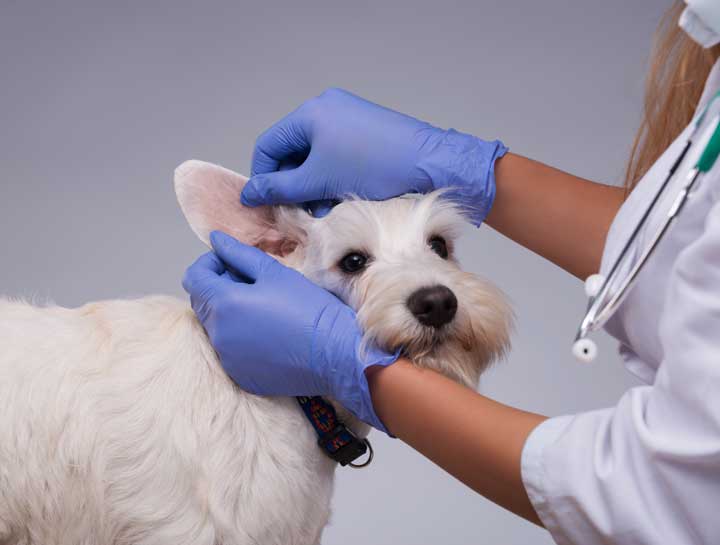Otolaryngology
The study of the ears, nose and throat.
Simply stated, otolaryngology is the study of the ears, nose, and throat. Some symptoms you may witness in your pet if these areas of the body are diseased include a head tilt, walking in circles, vomiting, rapid eye movements from side to side, inability to stand, the odor coming from the ear(s), discharge or blood from the nostril(s), choking, difficulty breathing, excessive panting especially when your pet is in a stressful situation, nasal congestion, deformity of the muzzle, gagging, reverse sneezing, pain on palpation of the head, and many others.
The veterinarians at Polo Springs Veterinary Hospital will begin your pet’s appointment by obtaining a thorough history of your pet’s problem and subsequently performing a detailed physical examination of them. These are important and necessary steps to help us make a definitive diagnosis of your pet’s problem, as some problems in these areas of the body may be obvious (ie. debris or discharge coming from a red, itchy, painful ear) while others may be very difficult to detect. In some instances, we may need to use special diagnostic equipment to evaluate these structures of your pet’s body in order to diagnose their problem.
Ear infections are one of the most common infections we see in our small animal patients. Classic symptoms of an ear infection include redness of the ear, discharge or debris in the ear, scratching at the ear, odor from the ear, head shaking, and pain when touching the affected ear. Because these infections are so prevalent, veterinarians at Polo Springs spend a considerable amount of time counseling pet owners on how to prevent ear infections in their pets. To prevent ear infections from occurring, it is critical to keep the canals clean and dry. Because we see so many problems resulting from an owner’s well-intentioned attempt at cleaning and/or treating their pet’s ears, we highly recommend first consulting with one of our veterinarians for instruction on proper ear cleaning technique, as well as regarding which ear cleansers are both safe and effective for your pet. We frequently see pets for a second opinion related to chronic recurrent ear infections. It is important to know that sometimes the recurrence is because the owner has never been counseled on proper ear cleaning products and technique, while other times it is because the pet is suffering from an underlying medical problem that has not been diagnosed and therefore addressed, so the ear infections keep coming back. Another very serious problem we witness is the misuse or overuse of previously prescribed ear medications. Problems will also develop if an ear infection is not fully resolved once treatment is stopped. These are just some of the reasons why we always recommend that before you treat your pet’s ears with any medication, they first be evaluated by one of our veterinarians. Every ear infection should be diagnosed and treated based on a cytological examination of the ear debris/discharge. This allows us to examine the ear specimen under the microscope to determine if there is an infection and what type of organism is causing the infection. Once we obtain this information, we will be able to prescribe the correct medication to safely and effectively treat your pet. If the infection is severe, we will also submit a sample to a laboratory for a culture.
During your pet’s appointment, we will spend whatever time is necessary to make sure you are confident in your ability to treat your pet’s infection. It is crucial that the ear cleanser and medication we prescribe for your pet are administered correctly and for the appropriate length of time. If a medication is stopped too soon, the infection will recur. This is why we stress the importance of rechecking examinations. If the infection is not completely gone, or if the medication is reused once symptoms recur, your pet could develop an extremely resistant infection that could be very difficult to resolve.
In some cases, the pet owners do everything right and their pet still experiences recurrent ear infections. If this is the case, we will discuss the potential of an underlying cause such as an allergy predisposing your pet to chronic recurrent ear infections. Once an underlying problem is diagnosed and treated, the ear infections should permanently resolve.
Vestibular disease is commonly confused by owners as a stroke, and it is terrifying to observe. The pet will have a head tilt, stumble or fall to one side, have rapid jerking eye movements, and even spin in circles. Typically this results in motion sickness for the pet causing them to vomit. These signs may not be related to a stroke at all, but to an inner ear problem that affects the vestibular (balance) system. There can be a variety of underlying causes such as an inner ear infection, a thyroid disorder, or an idiopathic (unknown cause) condition that develops in older dogs.
Regardless of the problem affecting the ears, nose, or throat of your pet, we will take a thorough and systematic approach to diagnose it. We will examine them, perform the necessary diagnostics and formulate an appropriate treatment plan to get your pet on the road to recovery. We also believe it is our duty to provide you with in-depth education to empower you to be an active participant in your pet’s care.
Call us at (719) 249-5835 today to schedule an appointment for your cat or dog.

